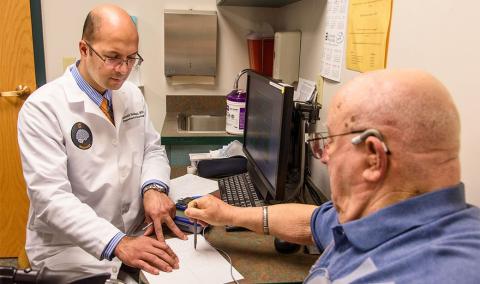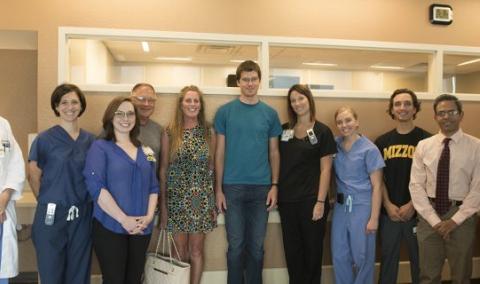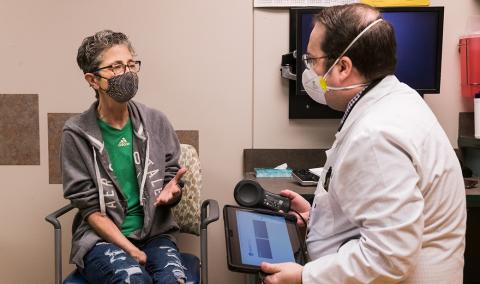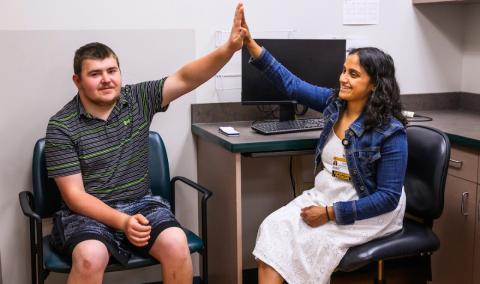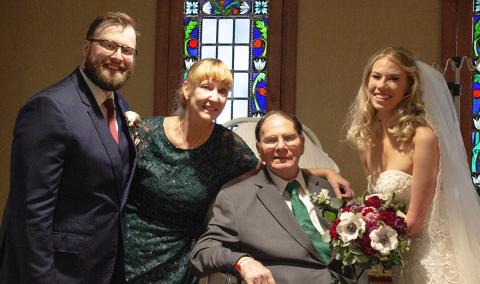Epilepsy is a neurological condition involving the brain that makes people more susceptible to having recurrent, unprovoked seizures. It is one of the most common disorders of the nervous system and affects people of all ages, races and ethnic background. Almost three million Americans live with epilepsy.
Living with epilepsy requires special care. It can affect your safety, relationships, work and much more. You want a team that can help you manage the condition and its symptoms.
University of Missouri Health Care has the most complete epilepsy care program in mid-Missouri. In fact, our program has been recognized as a Level 4 Epilepsy Center by the National Association of Epilepsy Centers. This means our doctors have the most advanced skills and resources needed to take care of the most complex epilepsy patients. We also have specialized care for children with epilepsy.
We are able to offer innovative surgeries to improve quality of life and manage the disease. You won’t find a team with more experience or the range of services we offer anywhere else in the region. Our epilepsy specialists, neurosurgeons, neuropsychologists, nurses, and others are here to provide you with personalized care.
Complete epilepsy treatment
Our goal is to help you lead a full life, on your terms. We’ll design a treatment plan to stop or control seizures and give you the best quality of life possible. We offer complete epilepsy care including:
- Anticonvulsant medicines. There are a number of medicines that can stop or cut down on seizures — because we are an academic health system, our doctors know about the newest treatment options. If medicine doesn’t work or the side effects are too hard to deal with, your doctor can provide you with other choices.
- Vagus nerve stimulation. Your doctor can implant a tiny device under the skin of your chest that stimulates the vagus nerve and can keep you from having a seizure. Like a heart pacemaker, the device is programmed to your needs.
- Epilepsy surgery. If medicine and other treatments aren’t working, surgery removes the tissue that’s causing seizures. We give you a complete exam to decide if surgery is right for you. Our neurosurgeons are highly skilled in the latest methods in epilepsy surgery.
Our epilepsy specialists (epileptologists) offer complete services to learn how epilepsy impacts your life — body, mind and spirit. This allows us to understand your needs and design a personalized plan to meet the hopes and goals you have for your treatment.
Noninvasive brain monitoring and imaging
Doctors use a range of tests to analyze your brain activity. These tests study flow in the brain and help doctors study the part of the brain that’s causing seizures.
These tests may include:
- Electroencephalogram (EEG) which evaluates electrical activity
- Magnetic resonance imaging (MRI) which shows brain structure and functional MRI (fMRI), and shows brain activity
- Positron emission tomography (PET) scan which also shows brain activity
- Single-photon emission computed tomography (SPECT) which shows true 3D brain images
Neuropsychological assessments
Our neuropsychologists (psychologists who specialize in brain illness and its effect on behavior) measure your mental functions and how epilepsy affects your cognitive (thinking) abilities. Your neuropsychologist works with therapists and other members of your specialist care team to help you overcome behavior and learning challenges.
Psychiatric exams
Psychiatrists are doctors who talk with you to better understand your moods and emotions. Your psychiatrist can give you support to help you improve your mood and well-being.
Invasive brain monitoring and presurgical testing
Epilepsy experts use more advanced exams and testing to learn more about what’s causing your seizures and to map areas of your brain. These minimally invasive procedures help doctors learn which areas of the brain control language and memory functions (WADA testing) and allow a closer look at your brain’s electrical function (intraoperative EEG). You might have these and other tests to decide if surgery is right for you.
We offer both outpatient clinic services and more advanced testing in our epilepsy monitoring unit (EMU). Our expert care team will focus on your needs and offer a treatment plan that’s made just for you.








